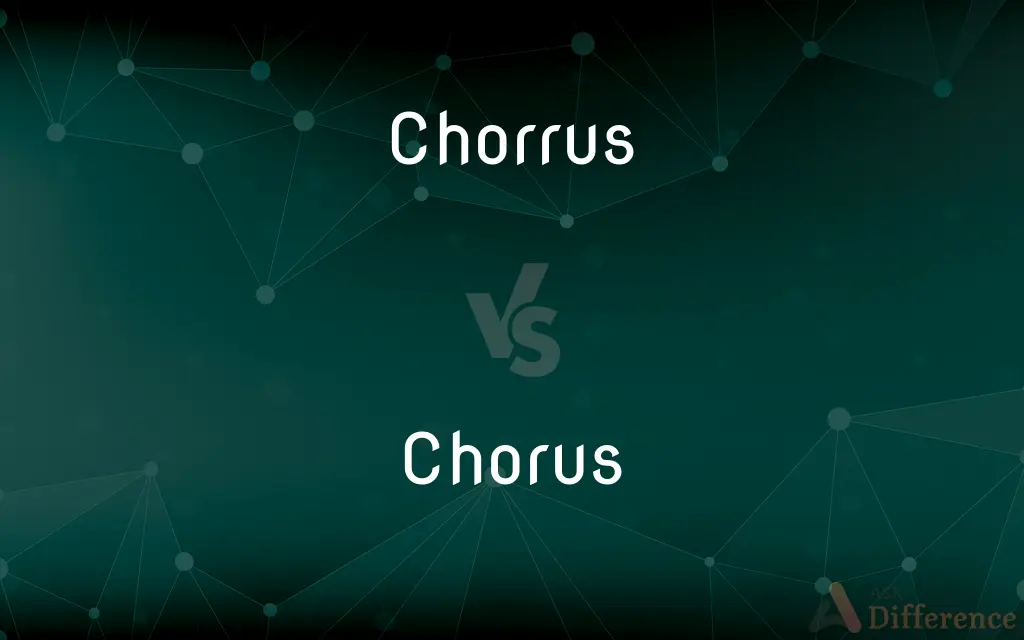Chorrus vs. Chorus — Which is Correct Spelling?
Edited by Tayyaba Rehman — By Fiza Rafique — Updated on April 4, 2024
Chorrus is an incorrect spelling, while Chorus is correct. A chorus is a part of a song or group of singers.

Table of Contents
Which is correct: Chorrus or Chorus
How to spell Chorus?

Chorrus
Incorrect Spelling

Chorus
Correct Spelling
ADVERTISEMENT
Key Differences
A "chorus" has one 'r' just like "song."
The musical "chorus" doesn't need extra 'r's to resonate.
Think of "Chorus" as "Core-Us," focusing on its core.
A group of singers is called a "chorus," not a "chorrus."
"Chorrus" has a double 'r' – too long for a song's part.
ADVERTISEMENT
How Do You Spell Chorus Correctly?
Incorrect: Chorrus of birds sang in the morning.
Correct: Chorus of birds sang in the morning.
Incorrect: He joined the school chorrus.
Correct: He joined the school chorus.
Incorrect: They practiced the chorrus together.
Correct: They practiced the chorus together.
Incorrect: A chorrus of applause filled the room.
Correct: A chorus of applause filled the room.
Incorrect: The chorrus in the song was very catchy.
Correct: The chorus in the song was very catchy.
Chorus Definitions
A repeated section in a song.
The chorus is the most memorable part of the song.
A group of singers.
The chorus sang in harmony.
A simultaneous utterance by many people.
The crowd erupted in a chorus of cheers.
A feature in electronic music to thicken the sound.
He added a chorus effect to his guitar.
A group of singers who perform together, usually singing multi-part compositions with more than one singer for each part.
A group of vocalists and dancers who support the soloists and leading performers in operas, musical comedies, and revues.
A musical composition usually in four or more parts written for a large number of singers.
A refrain in a song, especially one in which the soloist is joined by other performers or audience members.
A solo section based on the main melody of a popular song and played by a member of the group.
A group of persons who speak or sing in unison a given part or composition in drama or poetry recitation.
An actor in Elizabethan drama who recites the prologue and epilogue to a play and sometimes comments on the action.
A group in a classical Greek drama whose songs and dances present an exposition of or, in later tradition, a disengaged commentary on the action.
The portion of a classical Greek drama consisting of choric dance and song.
A speech, song, or other utterance made in concert by many people.
A simultaneous utterance by a number of people
A chorus of jeers from the bystanders.
A simultaneous production of sound by numerous animals
The midday chorus of cicadas.
A simultaneous production of sound by numerous inanimate objects
A chorus of lawnmowers from the neighborhood's backyards.
To sing or utter in chorus.
A group of singers and dancers in a theatrical performance or religious festival who commented on the main performance in speech or song.
A song performed by the singers of such a group.
An actor who reads the prologue and epilogue of a play, and sometimes also acts as a commentator or narrator; also, a portion of a play read by this actor.
A group of singers performing together; a choir; specifically, such a group singing together in a musical, an opera, etc., as distinct from the soloists; an ensemble.
The performance of the chorus was awe-inspiring and exhilarating.
(by extension) A group of people in a performance who recite together.
An instance of singing by a group of people.
(figuratively)
A group of people or animals who make sounds together.
A chorus of crickets
A chorus of whiners
The noise or sound made by such a group.
A chorus of shouts and catcalls
(music)
A piece of music, especially one in a larger work such as an opera, written to be sung by a choir in parts (for example, by sopranos, altos, tenors, and basses).
A part of a song which is repeated between verses; a refrain.
The catchiest part of most songs is the chorus.
The main part of a pop song played after the introduction.
A group of organ pipes or organ stops intended to be played simultaneously; a compound stop; also, the sound made by such pipes or stops.
A feature or setting in electronic music that makes one instrument sound like many.
(Christianity) A simple, often repetitive, song intended to be sung in a group during informal worship.
(jazz) The improvised solo section in a small group performance.
(transitive)
To sing (a song), express (a sentiment), or recite or say (words) in chorus.
To express concurrence with (something said by another person); to echo.
(rare) To provide (a song) with a chorus or refrain.
(intransitive)
To sing the chorus or refrain of a song.
To sing, express, or say in, or as if in, unison.
To echo in unison another person's words.
Of animals: to make cries or sounds together.
A band of singers and dancers.
The Grecian tragedy was at first nothing but a chorus of singers.
A company of persons supposed to behold what passed in the acts of a tragedy, and to sing the sentiments which the events suggested in couplets or verses between the acts; also, that which was thus sung by the chorus.
What the lofty, grave tragedians taughtIn chorus or iambic.
An interpreter in a dumb show or play.
A company of singers singing in concert.
A composition of two or more parts, each of which is intended to be sung by a number of voices.
Parts of a song or hymn recurring at intervals, as at the end of stanzas; also, a company of singers who join with the singer or choir in singer or choir in singing such parts.
The simultaneous of a company in any noisy demonstration; as, a Chorus of shouts and catcalls.
To sing in chorus; to exclaim simultaneously.
Any utterance produced simultaneously by a group;
A chorus of boos
A group of people assembled to sing together
The part of a song where a soloist is joined by a group of singers
A body of dancers or singers who perform together
A company of actors who comment (by speaking or singing in unison) on the action in a classical Greek play
Utter in unison;
`yes,' the children chorused
Sing in a choir
The part of a drama sung by a choir.
The Greek play featured a chorus narrating the tale.
Chorus Meaning in a Sentence
During the concert, the audience joined in the chorus.
The chorus of the sea waves was soothing at night.
She always wanted to sing in the chorus because she loves to perform.
Every morning, a chorus of birds greets me.
A chorus of laughter erupted from the classroom.
The chorus line danced in perfect synchronization.
The chorus of a song often sticks in my head for days.
The most memorable part of the play was the chorus singing.
A chorus of frogs began their evening song as the sun set.
A chorus of cicadas signaled the start of summer.
He writes the lyrics and the chorus for his band's songs.
In ancient Greek theater, the chorus would explain the action.
Listening to the chorus practice was her favorite part of the day.
The teacher asked for volunteers for the school chorus.
The chorus adds harmony to the verses of the song.
The choir transformed into a powerful chorus for the finale.
They rehearsed the chorus for weeks to get it right.
A powerful chorus can turn a simple song into an anthem.
The chorus of the national anthem is known by everyone in the country.
The band invited the audience to sing the chorus with them.
Chorus Idioms & Phrases
A chorus of approval
A group expression of approval or praise.
When she finished her speech, a chorus of approval erupted from the audience.
Join the chorus
To add one's voice to a growing number of people saying the same thing.
Many people are complaining about the policy, and I join the chorus of dissent.
In chorus
Doing something all together at the same time.
The crowd answered in chorus, showing their unanimous agreement.
Common Curiosities
What is the pronunciation of Chorus?
Chorus is pronounced as "KOR-us."
Which vowel is used before Chorus?
It depends on the context, but often "a" as in "a chorus."
Why is it called Chorus?
The term "chorus" originates from Ancient Greek drama, where it referred to a group of performers singing and dancing.
What is the plural form of Chorus?
The plural form is "choruses."
Which preposition is used with Chorus?
"In" can be used, as in "in chorus."
Which article is used with Chorus?
Both "a" and "the" can be used depending on the context.
Is Chorus a negative or positive word?
Chorus is neutral; it's neither inherently negative nor positive.
What is the root word of Chorus?
The root word is the Latin "chorus" which came from the Greek "choros," meaning dance or choir of dancers.
What is the verb form of Chorus?
There isn't a standard verb form of "chorus," but in some contexts, "chorused" can be used to mean many people saying something simultaneously.
Is the word Chorus imperative?
No, chorus is not imperative.
Is Chorus a countable noun?
Yes, you can have one chorus or multiple choruses.
Is the Chorus term a metaphor?
Not inherently, but it can be used metaphorically, e.g., "a chorus of complaints."
What part of speech is Chorus?
Chorus is a noun.
What is the singular form of Chorus?
The singular form is "chorus."
Which conjunction is used with Chorus?
Any conjunction can be used with "chorus" based on context. No specific conjunction is inherently tied to it.
Is Chorus an adverb?
No, chorus is not an adverb.
What is the opposite of Chorus?
There isn't a direct opposite, but "solo" is contrasting in musical contexts.
Is Chorus a noun or adjective?
Chorus is primarily a noun.
Is the word Chorus a gerund?
No, chorus is not a gerund.
Is the word "Chorus" a Direct object or an Indirect object?
"Chorus" can be either, depending on sentence structure.
Is Chorus a vowel or consonant?
Chorus is a word, not a letter. It contains both vowels and consonants.
How many syllables are in Chorus?
Chorus has two syllables.
What is the stressed syllable in Chorus?
The first syllable, "Chor," is stressed.
What is another term for Chorus?
Refrain.
Is Chorus an abstract noun?
No, chorus is a concrete noun.
Is Chorus a collective noun?
Yes, when referring to a group of singers.
How do we divide Chorus into syllables?
cho-rus .
Share Your Discovery

Previous Comparison
Raely vs. Really
Next Comparison
Botom vs. BottomAuthor Spotlight
Written by
Fiza RafiqueFiza Rafique is a skilled content writer at AskDifference.com, where she meticulously refines and enhances written pieces. Drawing from her vast editorial expertise, Fiza ensures clarity, accuracy, and precision in every article. Passionate about language, she continually seeks to elevate the quality of content for readers worldwide.
Edited by
Tayyaba RehmanTayyaba Rehman is a distinguished writer, currently serving as a primary contributor to askdifference.com. As a researcher in semantics and etymology, Tayyaba's passion for the complexity of languages and their distinctions has found a perfect home on the platform. Tayyaba delves into the intricacies of language, distinguishing between commonly confused words and phrases, thereby providing clarity for readers worldwide.


































